Hold the United States Accountable: The Internationally Recognized Rights of the 'Internally Displaced'
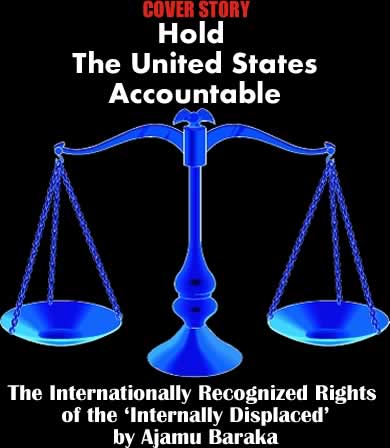
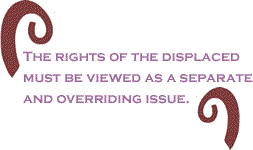
In the aftermath of Hurricane Katrina, the debate is already raging on how to deal with those displaced by the disaster and whether to rebuild New Orleans and other coastal communities. Competing interests combined with poor planning and a disjointed response from public and private agencies have created confusion about priorities, funding and other crucial details. It is imperative that a human rights and humanitarian law framework be applied to these discussions and form the basis for all future action.
The United Nations Guiding Principles on Internal Displacement provide just such a framework. The principles identify the internationally recognized rights and guarantees of people who have been forcibly displaced from their homes and communities due to a number of factors, including natural disaster. According to this set of principles, those who have been displaced from their homes but not crossed international borders are classified as “internally displaced persons,” not “refugees” or “evacuees.” This is not a mere question of semantics, but an essential definition that establishes the obligations that government has to protect and defend the rights of the Gulf Coast residents who have been dispersed across the country.
The extent to which various aspects of the recovery should be funded will be a topic of much debate among policymakers, especially given the federal deficit and competing economic needs. But the rights of the displaced must be viewed as a separate and overriding issue. Receiving protection and humanitarian assistance from government authorities is not an act of benevolence, but rather is obligatory for displaced people – for the duration of their displacement. This will be especially important to remember after media coverage of Katrina has faded, and we must not compound the plight of the displaced by letting them fend for themselves once the dust has settled. If we accept that it will take years to rebuild New Orleans, we must also accept that it will take no less time to rebuild the lives of the displaced from New Orleans and throughout the Gulf Coast.
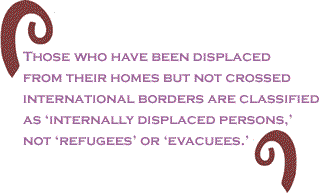
One of the most contentious issues that will emerge in the near future is the fate of the large numbers of people, largely poor and African American who may want to return to their homes and communities but may not have the resources to do so. But as the U.N. guidelines clearly state, “Authorities have the duty and responsibility to assist returned and/or resettled internally displaced persons to recover, to the extent possible, their property and possessions which they left behind or were dispossessed of upon their displacement.” We know that there are powerful forces in New Orleans and elsewhere on the coast who would prefer that the poor of those communities not be allowed to return. Low- and middle-income property owners will have particular difficulty meeting their financial obligations and will require protection from creditors; speculators are already targeting the most vulnerable and desperate property owners, offering cash for their holdings at pennies on the dollar. The sharks are circling, and we must ensure that they are not allowed to feed.
In fact, the problems the displaced will face in the future may well dwarf what they’ve already been through. Assessing and then meeting the individual needs of several hundred thousand people scattered in dozens of states will be a difficult and time-consuming task, the magnitude of which argues strongly for a coordinated response that must begin now. This might well include a role for the U.N. High Commission on Refugees, which has considerable experience with displacement issues, and other international agencies. Regardless of the mechanism, alternatives to dumping the entire recovery burden on FEMA or other already-overextended agency must be explored. Without a coordinated plan that specifically addresses critical long-term issues, the likelihood will only increase in coming months that the most powerless victims of Katrina will be left with nothing.
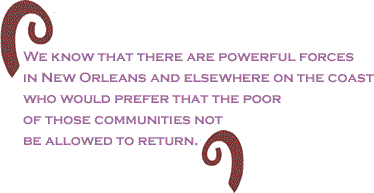
The disproportionate hardships shouldered by poor, mostly minority residents of the Gulf Coast in the wake of Katrina have been well-documented and acknowledged by most observers. It is not enough, however, to address this reality merely by issuing debit cards, formulating more equitable evacuation plans or otherwise better preparing for future disasters. Rather, as the U.N. principles clearly state, continued relief efforts must be viewed in the context of providing meaningful opportunities for the displaced and their families in the months and years to come. Stories of evacuees airlifted to destinations far from their families and friends, sometimes against their will, reinforce the importance of viewing the emergency measures as a temporary, not a permanent, solution. The idea that evacuees will remain where they’ve been dropped assumes that they have no other options; providing such options is an essential component of the government’s obligation according to the U.N. principles.
Missing from the press conferences and official statements has been any commitment to another of the U.N. principles: that the victims of Hurricane Katrina have the ability to decide for themselves how to reconstruct their lives. As the principles state unequivocally, the displaced have an inalienable right to participate in decisions about their future, and any recovery plan in Katrina’s aftermath must therefore include substantive input by those who have the most at stake. This is not a courtesy that can be discarded if it becomes inconvenient, but an absolute necessity.
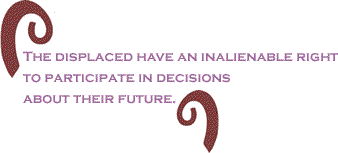
It is important to note that the United States has consistently upheld the U.N. Guiding Principles on Internal Displacement when similar circumstances have arisen in other countries. If the fundamental rights of displaced people apply in countries far less able to cope with such disasters as Hurricane Katrina, they certainly apply here.
Ajamu Baraka is Director of the U.S. Human Rights Network, a coalition of more than 170 organizations working on the full spectrum of human rights issues. Formed to promote U.S. adherence to universal human rights standards by building links between organizations as well as individuals across the nation, the Network strives towards building a human rights culture that puts those directly affected by human rights violations in a central leadership role. The Network also works to connect the U.S. human rights movement with the broader U.S. social justice movement and human rights movements around the world. He can be reached at abaraka [at] ushrnetwork [dot] org.
